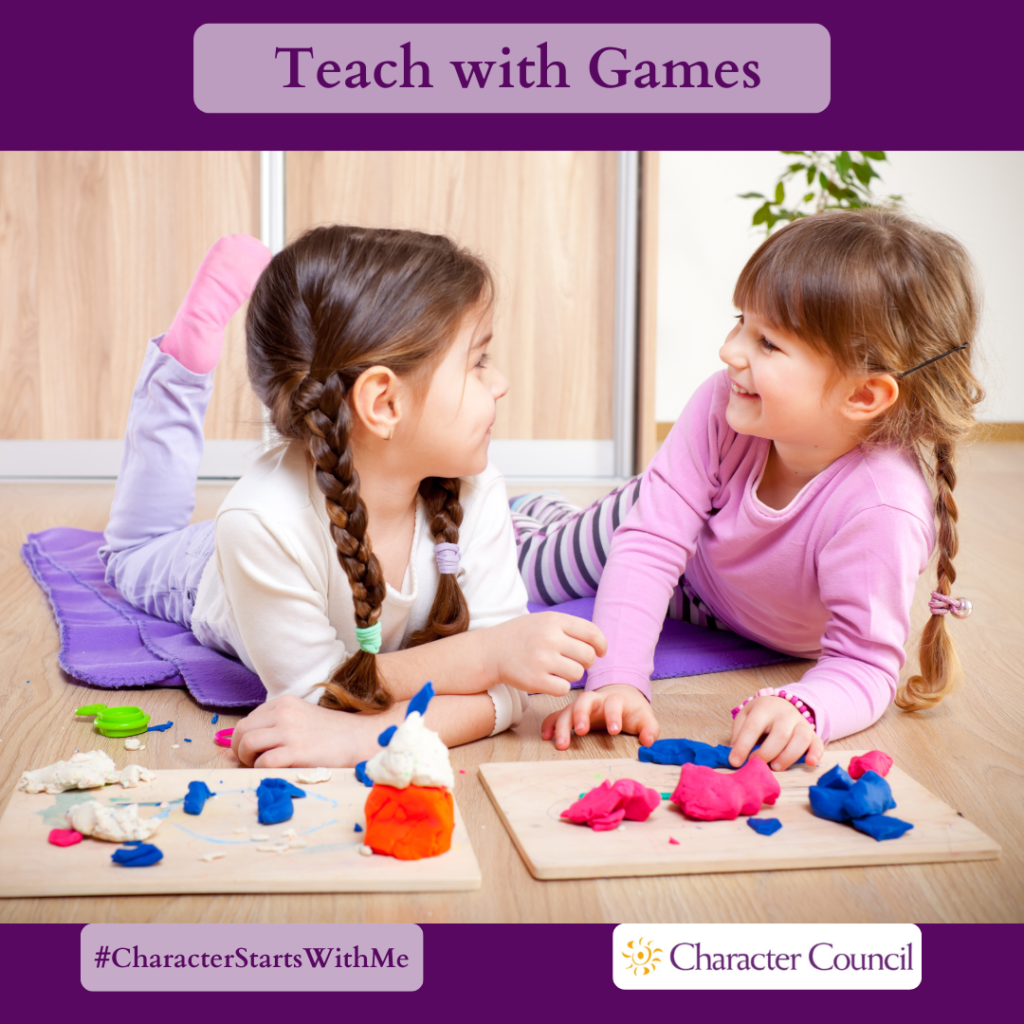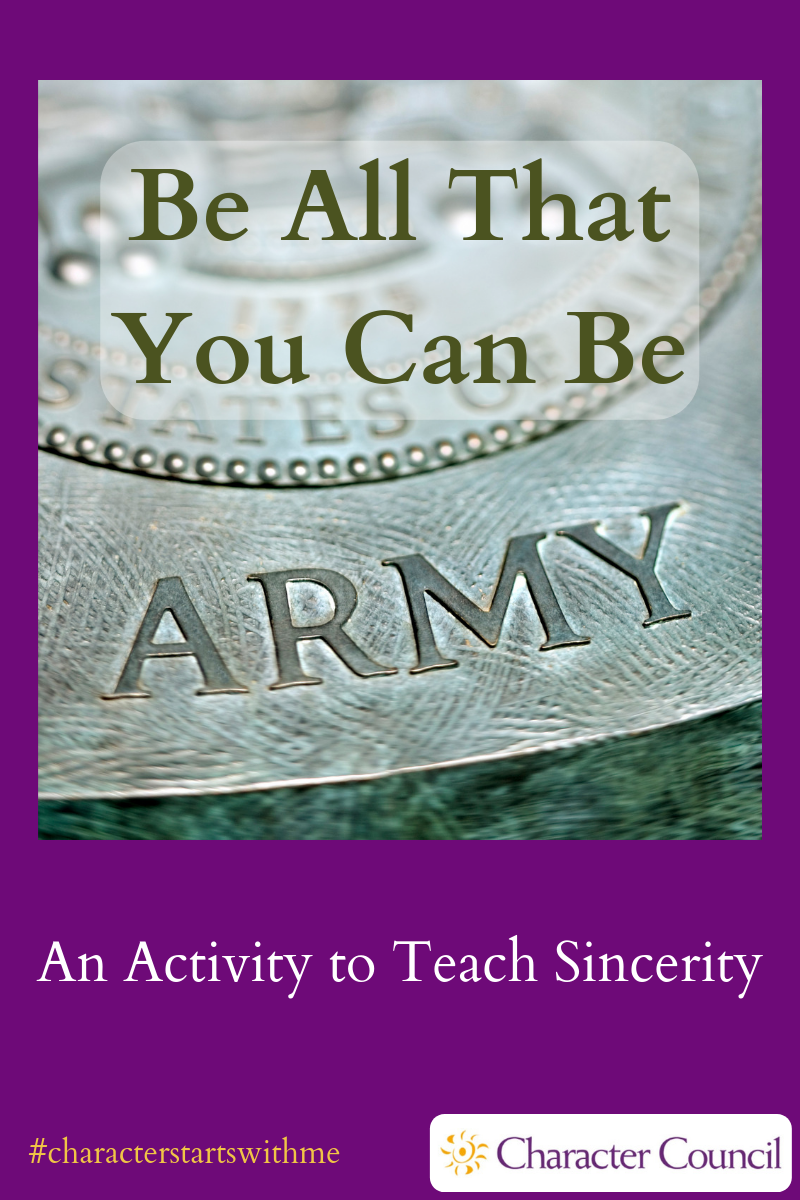
Sincerity Activities
The activities here are fun ways to teach character. The game aspect makes the lesson more memorable. Each activity has processing questions at the end. Without processing the activity, the exercise is just a game. To make it a stronger lesson when you process it, relate the character quality to a core value that your organization promotes.
Consider picking a student to run the activity. You will need to give them time ahead of the activity to prepare. Another option is to pick a few students to run the activity for a younger classroom after you have run it for your class. Encourage your students to repeat it in the home for younger siblings or even parents.


Be All That You Can Be
Discuss the Army slogan of “Be All That You Can Be” with the students. (If they don’t know it, you can use the video below to play the commercial for them.) Then write out the letters to the word ARMY vertically on the board or you can reproduce it on paper for each student or group of students. Using these letters ask the students to come up with words or phrases that start with these letters that describe someone who is Sincere. Some suggestions: A – authentic, actual, R – real, respectful M – moral, mean what they say, Y –Yours truly. (This almost certainly requires the use of a Thesaurus.)
The second part of this exercise is to use the A for Always and the R for Rarely and come up with behaviors of sincere and insincere behaviors that would fall into these two categories. When you are done with that, go back to the word ARMY and the letters that are left spell MY so have them choose a behavior from either list – one they recognize in themselves. If it is on the A list they will want to continue it or if it is on the R list they will want to work on eliminating it. It is not necessary for them to share which one they choose.
To process this activity, ask these questions:
- Had you heard the Army slogan before?
- Was it difficult to think of ideas to use for this exercise?
- Why do you think it is important to be all that you can be?
- If you were choosing a friend, would you want them to be sincere or insincere?
- How would others look at you as a friend? Sincere or insincere? (silent answers)
- The next time you are making a choice of how to behavior, will you think of this exercise and the lists and determine which list it is on before you do it?

What’s In Your Wallet?
You will recognize this phrase from the Capital One commercials. There are several versions on You Tube you can show the class if they are not familiar with the commercial. Then begin the exercise by telling this story: A long time ago (before cell phones), a rich and famous man took a trip in his car. He had traveled far and was thinking about other things and didn’t pay attention to his gas tank. He ran out of gas. Since it was very late, he decided to walk back to a hotel he had recently passed. When he went in to get a room, he realized he had forgotten his wallet. He tried to convince the hotel clerk that he was rich and that one of his assistants would bring his wallet to him in the morning. The clerk didn’t believe him and sent him on his way. The rich man walked back to his car and spent the night there. In the morning, he went back to the hotel and used the phone to call someone from his office to bring his wallet. The point? It doesn’t matter how much money you have if you can’t get to it. Same goes for skills and talents. The human brain is capable of so much more than what the average human uses it for. If you don’t spend time to recognize and develop skills and talents, you will not have them to use when you need them. For this exercise, give the students each a piece of paper with the outline of a wallet drawn on it. (Look for the link to download the PDF.) They are to write down a skill or a talent that they have and would like to increase or one that they would like to develop. They will also need to write down a few things they would need to do in order to develop that talent. Sometimes we hold dreams or wishes inside and not act on them. This exercise will help to turn some of those into goals on the outside.
BONUS CHALLENGE: Write Your Own Jingle
Since two of our activities have dealt with slogans, here is an added challenge for the students this month. There are a lot of TV Commercials with jingles and slogans that can be used to describe Sincerity. Let the students suggest slogans all month long. Find a place in the room where they can be posted. Here are a few examples: Got Sincerity? (Got milk?) Pardon me, Do You have any Sincerity? (Grey Poupon). Choosy mothers choose Sincerity (Jif).
To process this activity, ask these questions:
- Did you remember the commercial?
- Did you enjoy the story of the rich man without his wallet?
- Did you have to think hard to come up with an item to “put in your wallet” or did it come easy?
- Had you ever thought about the steps needed to get to that goal before?
- What character qualities do you need to help you in the steps to your new goal?

The Oranges
This exercise can be done one of several ways. You can start with a discussion of what you expect from certain people based on the behavior that you have witnessed already. Use an orange to demonstrate this expectation. You can place a small slice in the orange and then squeeze the orange juice from the orange into a glass. When you see an orange, you expect to get orange juice from it. If you want to get tricky you can use a needle-like turkey baster to inject food dye into the orange. Injecting via the navel of the orange is the best way to disguise the injection site. When you squeeze this prepared orange, it won’t look like orange juice. This will demonstrate insincerity – being different on the inside than how we act on the outside.
To process this activity, ask these questions:
- Were you surprised to see orange juice coming from the first orange?
- Were you surprised to see the other color coming from the second orange?
- Have you ever seen somebody act differently than you expected?
- Have you ever acted differently than a teacher or parent expected you to act?
- How does it feel when you act out wrongly?
- Will you think of the orange the next time you are tempted to act out?